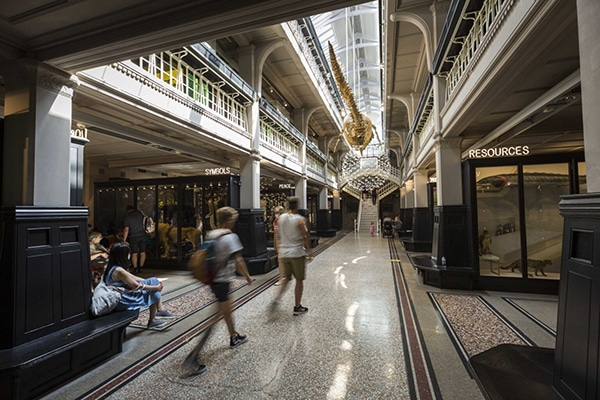Simon Stephens, Manchester Museum named European Museum of the Year, Museums Association, 27 May 2025
Ceremony held in the Polish city of Białystok where five other awards were announced.

Manchester Museum was given the European Museum of the Year Award (Emya) at a ceremony held last week in the Polish city of Białystok.
The award was presented as part of the four-day Emya2025 annual conference, which was organised by the European Museum Forum (EMF) and hosted by the Sybir Memorial Museum. Five other awards were announced at the event.
Manchester Museum reopened in February 2025 following a £15m redevelopment.
Amina Krvavac, chair of the Emya jury, said: “The museum has reimagined its mission, acknowledging and addressing its complex history by redefining the role of its collections and public programmes.
“As a university museum, it plays a vital role not only in academic research but also in advancing social responsibility and justice. This is reflected in its co-curation approach – an ongoing process involving collaboration with local and diasporic communities to incorporate multiple perspectives into the interpretation and presentation of its collections.
“Through thoughtful, informed, and impactful community engagement, the museum continues to invest in creating a truly inclusive space – where all individuals, regardless of identity or background, can see themselves reflected and represented.”
The European Museum of the Year Award is given each year to a museum that “contributes profoundly to our understanding of the world”.
The Council of Europe Museum Prize was won by Euskararen Etxea (House of the Basque Language) in Bilbao.
The Council of Europe Museum Prize is awarded to a museum that has “contributed significantly to upholding human rights and democratic citizenship, to broadening knowledge and understanding of contemporary societal issues, and to bridging cultures by encouraging inter-cultural dialogue or overcoming social and political borders”.
Emya said that the House of the Basque Language is a “unique cultural space dedicated to the Basque language, its history, and the stories of resilience and identity associated with it. The museum’s focus is on the intangible heritage of the Basque language, offering visitors an immersive experience that goes beyond objects to reflect the deep emotions, challenges, and resistance tied to the Basque culture.”
The Kenneth Hudson Award for Institutional Courage and Professional Integrity was won by Nini Sanadiradze, a former general director of the Union of Tbilisi Museums, Tbilisi, who “demonstrated unwavering commitment to democratic principles, despite repeated attempts to undermine her integrity”.
The Meyvaert Museum Prize for Environmental Sustainability went to Muzoo, La Chaux-de-Fonds, Swizerland.
Emya said: “Its use and care of its natural spaces, including managing a municipal park and a zoological garden, aims to foster new attitudes about animal welfare, inviting community members to care for local animals. Its commitment to environmental sustainability also makes this museum a central hub for local biodiversity associations, contributing to citizen science.”
The Portimão Museum Prize for Welcoming, Inclusion, and Belonging was won by the Istanbul Museum of Modern Art in Istanbul. The venue “fosters new conversations about the evolving nature of culture and society”, according to Emya.
The Silletto Prize for Community Participation and Engagement was won by the Alvor Lifeguard Interpretative Centre, Portimão.
The centre “is a living, breathing community centre that actively supports the continuation of traditional artisanal fishing practices and the preservation of endangered skills,” said Emya. “Through co-curated displays, residents can see their own lives, labour, and traditions reflected with dignity and value.”
